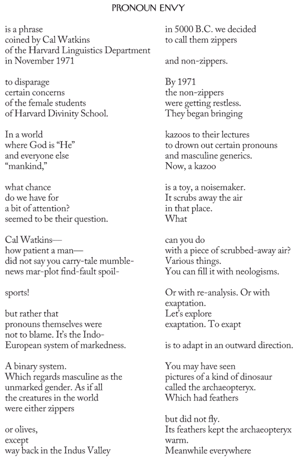February 13, 2014 @ 2:56 pm
· Filed by Ben Zimmer under Humor, Language contact, Lost in translation, Obituaries, Phonetics and phonology
The obituaries for the great comic Sid Caesar invariably mention his proficiency in "double-talk," mimicking the sounds (but not the sense) of foreign languages. (On the phenomenon of double-talk, see Mark Liberman's posts on yaourter here, here, here, and here.) It turns out that this was a talent Caesar had cultivated ever since he was a boy clearing tables at his father's restaurant in multi-ethnic Yonkers.
Read the rest of this entry »
Permalink
February 13, 2014 @ 2:43 pm
· Filed by Victor Mair under Lost in translation
A friend of Brendan O'Kane in Beijing posted this screenshot of the Chinese-localized interface for her new Jawbone UP fitness tracker (alarm function) on Weixin last night:

Read the rest of this entry »
Permalink
February 13, 2014 @ 11:41 am
· Filed by Mark Liberman under Prescriptivist poppycock
Several people have written to me about the so-called "Hemingway" app, which offers to give you detailed stylistic advice about your writing. One useful way to evaluate programs of this kind is to see what they do with good writing — and given this effort's name, it makes sense to check out its opinion about the prose of Ernest Hemingway.
Read the rest of this entry »
Permalink
February 13, 2014 @ 7:12 am
· Filed by Geoffrey K. Pullum under Language and the media, Semantics, Taboo vocabulary
The "Say What?" feature on the Doonesbury site quotes this error correction from the New Jersey Star-Ledger newspaper, about the misreporting of something Governor Chris Christie's chief spokesman Michael Drewniak said:
An earlier version of this story incorrectly stated Drewniak referred to the Port Authority's executive director as a 'piece of crap.' While Drewniak did call him a 'piece of excrement,' it was David Wildstein who referred to the executive director as a 'piece of crap.'
What do we learn from this? (Remember, this is Language Log, not New Jersey Politics Log.)
Read the rest of this entry »
Permalink
February 12, 2014 @ 8:04 pm
· Filed by Mark Liberman under Crash blossoms
Jonathan Amos, "Scientists count whales from space", BBC News 2/12/2014.
It's amazing how sensitive the measurement and modeling of gravitational perturbations of exoplanet systems has become, but detecting the effects of whales is a whole new level. Anyhow, apparently, whales are Out There…
Read the rest of this entry »
Permalink
February 12, 2014 @ 6:15 am
· Filed by Geoffrey K. Pullum under Dialects, Inflection, Literacy, Morphology, Prescriptivist poppycock, relative clauses, Silliness, Style and register, Syntax, Usage advice
What a fool I've been, thinking all the time that the important stuff was about evidence and structure and the search for genuine syntactic principles — trying to find out through study of competent speakers' usage what are the actual principles that define (say) marking of accusative case on pronouns in Standard English. God, I've been wasting my life.
Wired magazine has published (just in time for Valentine's Day) a large-scale statistical study of what correlates with numbers of responses to online dating ads (and let me say here that I am deeply grateful to Charles Hallinan for pointing it out to me). Much of the survey relates to the words used in the ad. For example, mentioning yoga or surfing in your ad has a positive influence on the number of contacts that will result. Some of the discoveries are curious: for men, it is much better to refer to a woman using the word "woman", but a woman's ad will do better if she refers to herself as a "girl". And (the point that has turned my life around, made on the infographic here), it turns out that men who use "whom" get 31% more contacts from opposite-sex respondents.
This changes everything! It's not just about the inflectional marking of relative and interrogative pronouns any more, people; it's about getting more sex!
Read the rest of this entry »
Permalink
February 11, 2014 @ 7:57 am
· Filed by Mark Liberman under Crash blossoms
"EU rules ‘mean children can't get life-saving cancer drugs’", Euractive 2/11/2014. Death panels in the Nanny State? As Ali G said to Sir Rhodes Boyson, "Wikkid, man."
Read the rest of this entry »
Permalink
February 10, 2014 @ 11:47 am
· Filed by Victor Mair under Borrowing, Language and food, Lost in translation
From a section of the Singapore site "Stomp" called "Murder of the English Language" comes this mystifying entree name:

Read the rest of this entry »
Permalink
February 9, 2014 @ 7:49 pm
· Filed by Victor Mair under Diglossia and digraphia, Topolects
Bruce Rusk, in a comment to "A bilingual, biscriptal product designation in Taiwan", mentioned "the informal Taiwanese Mandarin pronunciation of 給 ('give') gei3 as gie (3rd tone?), which is not a 'legal' Mandarin syllable" and noted that he "always assumed it was influenced by Taiwanese."
Bruce's mention of "給 ('give') gei3" in turn reminds me of a related Taiwanese-Mandarin interference that affected my own speech in a profound way.
Read the rest of this entry »
Permalink
February 9, 2014 @ 3:12 pm
· Filed by Mark Liberman under Linguistic history
A few years ago, I wrote about a presentation by Bridget Jankowski on the trend towards increasing use of 's as opposed to of, in phrases like "the government's responsibility" vs. "the responsibility of the government". My post was "The genitive of lifeless things", 10/11/2009, and the slides from her talk are here.
I was reminded of this recently, while looking at usage changes in State of the Union messages over the centuries. Apostrophe-s has seen a recent radical increase in SOTU frequency, reflecting in amplified form a more gradual increase in the English language as a whole. Such gradual, long-term trends are a puzzle: why and how do linguistic changes keep going for several centuries in the same direction, as they often do? You could ask the same question about other cultural changes, I guess, but for linguistic features that are preserved in the written form of a language with a textual history, like English, we have quantitative evidence over hundreds of years.
Read the rest of this entry »
Permalink
February 9, 2014 @ 12:43 am
· Filed by Victor Mair under Classification, Dialects, Language and education, Language and politics, Language and the law, Language and the media, Multilingualism, Topolects
Whether Cantonese is a language or a dialect is a subject that we have touched upon many times on Language Log, e.g., "Spoken Hong Kong Cantonese and written Cantonese" (see especially the remarks in the second half of the original post) and "English is a Dialect of Germanic; or, The Traitors to Our Common Heritage ."
But now it has become a hot-button issue in China, especially in Hong Kong, where the government's Education Bureau recently made a monumental gaffe by declaring that Cantonese was not an official language of the Special Administrative Region: "Education Bureau rapped over Cantonese 'not an official language' gaffe: Claim Cantonese 'not an official language' leaves public lost for words."
Here's an article in Chinese on the uproar that followed the announcement of the Education Bureau that Cantonese is not an official language of Hong Kong.
Read the rest of this entry »
Permalink
February 8, 2014 @ 5:25 pm
· Filed by Mark Liberman under Language and culture
In the New Yorker for February 10, 2014, a poem by Anne Carson:

Read the rest of this entry »
Permalink
February 8, 2014 @ 8:26 am
· Filed by Mark Liberman under Semantics
"Woody Allen Speaks Out", NYT 2/7/2014:
Not that I doubt Dylan hasn’t come to believe she’s been molested, but if from the age of 7 a vulnerable child is taught by a strong mother to hate her father because he is a monster who abused her, is it so inconceivable that after many years of this indoctrination the image of me Mia wanted to establish had taken root?
As usual, it's hard to keep score, but there might be an extra negative in that first clause.
Read the rest of this entry »
Permalink


